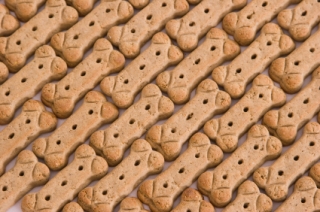5 Myths About Training Dogs With Treats

Another article discussing experts that are critical of Cesar Millan has hit the Internet. Actually, I think two articles were published this week, but I can't find the link for the other.
Truth be told, I only really skim these articles lately. They all follow the same general outline:
Someone or some group of people who know an awful lot about animal behavior/dogs/wolves are critical of Cesar Millan's methods. Cesar pays some token lip service to established science while holding the line on his pack theory hogwash. National Geographic, if they even bother to comment, really don't care because they have great ratings and that's really what matters.
I do sometimes jump to the comments to see if there's anything interesting there. Unfortunately, I frequently see the same few myths about training with food, and they make me cranky and sarcastic. (Ok, more cranky and sarcastic.) So, by gathering them together in one place, I'm hoping that Cesar's fans can locate and use them more easily and I'll find them easier to ignore in this normalized form. (By the way, you'll want to copy and paste the parts in bold, guys.)
- Treats are bribes. This myth is the old standard. The "Greensleeves" of treat disparagement, if you will. Let's be clear: a bribe and a reinforcer are not the same thing. A bribe is produced before the desired behavior, a reinforcer is produced after the behavior. Yes, some people do show their dogs a treat before asking them to do something. They're doing it wrong.
- If you use food, your dogs will not obey you without it. Here again is a myth based on bad training. The only reason your dog would refuse to perform without food is because she's used to seeing it beforehand. You're doing it wrong.
- Dogs should work because they want to please you. Some people seem to think that dogs should find working for their people inherently rewarding, like Jeeves and Wooster, or Smithers and Burns. When you think about it, it's pretty silly. Yes, it's true that dogs and humans have lived side-by-side for millennia, and as a result we are uniquely suited to work together, but the idea that this relationship is so one-sided that dogs will perform for no tangible reward makes no sense and is anthropomorphism, plain and simple. It's nice, it's romantic, and it makes for a great tear-jerker, but sorry folks; Disney dogs exist only in Disney movies.
- Dogs should work for praise. Closely related to the the previous myth is the idea that dogs find praise inherently rewarding. Some dogs actually do find praise rewarding, and it's also possible to condition praise as a reinforcer (it may even happen as a side effect of a good relationship), but the idea that all or even most dogs are eager to work for just a pat on the head or a "good dog" is more fantasy.
- Training for treats is fine for tricks, but not for "real training." I really find this one mystifying, but actually see it most often expressed by trainers. Is it that dogs instinctively know the difference between tricks and "real training" and take one less seriously than the other? Or maybe that behaviors trained without food are more reliable? What makes them more reliable? A lack of food? An emphasis on punishment or the threat of punishment? Maybe it's that inherently rewarding praise? Why would one reinforcer always lead to less reliable performance than another, regardless of the situation and individual dog?
The fact is (you'll want to stop reading now if you don't like facts) food is just another tool. It's the most commonly used reinforcer for trainers that emphasize positive reinforcement for a very simple reason: it's frequently the greatest common denominator for reinforcers. Eight new dogs. One hour. One room. Eight handlers, at least six of them have no experience. Yup, food. Try some tug later, but there's a good chance a couple of dogs just won't play in the presence of a bunch of new dogs.
But if you're using food wisely it'll be out of the picture pretty quickly, and only used as a random reward once a new behavior is trained. You'll also be introducing alternative rewards like play and yes, praise, too.
The idea that training with treats leads to people walking around with treats in their pockets for as long as they have their dogs is based on a poor understanding of how good dog training works.




